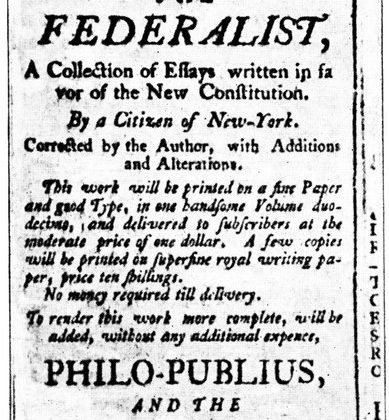

My text is from the Federalist, no. 55.
As there is a degree of depravity in mankind which requires a certain degree of circumspection and distrust, so there are other qualities in human nature which justify a certain portion of esteem and confidence. Republican government presupposes the existence of these qualities in a higher degree than any other form. Were the pictures which have been drawn by the political jealousy of some among us faithful likenesses of the human character, the inference would be, that there is not sufficient virtue among men for self-government; and that nothing less than the chains of despotism can restrain them from destroying and devouring one another.
The United States of America began as an act of faith. A small group of men (and women too) in the 18th c. had a crazy idea: Let’s let the people govern themselves!
Had I been there, say at a town meeting where this notion was being proposed, I would have raised my hand and asked, “Um, that sounds nice, but have you met these ‘people’ you speak of?”
But the society the founders surveyed was no more virtuous, or intelligent, or literate, or circumspect, or judicious, or empathetic, or sympathetic, or name-your-quality, than our own. Numbskullery, selfishness, tribalism, partisanship, jealousy, sharp-dealing, hard-heartedness, short-term thinking, cowardice, nastiness, failures of nerve, even sadism, were no less prevalent then than now.
Reading the founders makes it eminently clear that whatever their faults might have been, naiveté regarding the human condition was not among them. Nevertheless, they embarked on this crazy experiment, unsure of its success, but ready for the gamble.
Note in the quote above what they don’t say. They don’t say “there are innumerable qualities in human nature which justify a robust esteem and confidence.” They don’t use the word “optimism.” And–sorry Martin Luther King, Jr.–but they don’t assure us that the arc of the moral universe, long though it may be, inevitably bends toward justice.
All they grant is that mankind is worthy of “a certain portion of esteem and confidence.” That portion may, at times, be exceedingly small, it may be overwhelmed by other, darker, qualities. Need we enumerate those times?
But the estimable qualities are there, somewhere, even when obscured by the uglier angels of our nature. Believing so is more an act of faith than of sight. It is a trust in things unseen, that allows a measure–just a measure–of hope, which I suspect is itself grounded in love.
Like a parent with a very wayward child, who has faith they will turn around, because they hope without evidence, because love can do no less, so the citizen of a republic must–or so I think–love his or her fellow man if they want this crazy experiment to continue.
There are, as Thomas Paine said, times that try men’s souls. A soul-trial is a different thing than a dissertation defense or a philosophical argument. It’s far more fundamental and far more human. It takes us back to what we are at our most basic–creatures made in the image of God. That God, Christians believe, loved mankind even in its lostness, even in its enmity.
So perhaps with a republic. Its foundation can seem an absurd extension of “a certain measure of confidence and esteem” to our fellow citizens, even when–especially when–they disappoint us. Fully aware that there are no guarantees.
In other words, an act of faith, of hope, and of love.